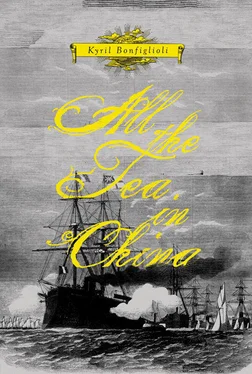“My orders are to make all speed to London with the teas. Positively no recruiting. The men we have must work harder. They will have had an easy time up until now.”
Peter opened his mouth, then shut it again.
“Now, Mister,” growled the Captain, “how soon will the ship be ready to sail?”
“She is ready to sail, Sir. As soon as the men are rested, that is.”
“Ready? Ready? Have you seen the state of the decks? Do you suppose I’m going to put to sea in a floating jakes, a stinking abattoir? Why are they not clean? Why are the men not at work?”
“Sir,” said Peter flatly, wearily, “the frigate’s Captain advised me to make the ship seaworthy first. We have completed with stores and water, sewn-up and buried our dead, repaired and renewed all burned and damaged rigging and done a hundred other necessary things. The decks, I was advised, could be properly cleansed when we were at sea, under plain sail.”
“Advised,” sneered Captain Dogg. “Ah, advised , Mr Stevenage, eh? You are one of those fellows, are you, always ready with someone to blame? I’ve met your sort before. I asked you, why are the men not at work on those abominable DECKS?”
Peter drew himself up and spoke in a languid and lordly voice I had not heard him use before.
“Sir, not a soul in this vessel has had a wink of sleep since fighting a bloody battle two nights ago. It is too dark to scrub decks, even if the men could be aroused from their exhaustion. I sent them to rest an hour ago. I gave these orders while in temporary command of this ship. So soon as you care to read me your orders I shall relinquish command to you and make an entry in the Ship’s Log to that effect. From that moment I shall of course accept your reprimands for any errors of judgment I may make — after that moment .”
Captain Dogg’s nasty old face wreathed itself into a sly and malignant smile.
“A sea-lawyer, too, Mr Stevenage? Well, well, we shall have much to learn from each other in the next few months, shall we not?” He fished out his Orders again, gabbled them out and touched the brim of his hat. Peter touched the brim of his and, taking the log from the deck-messenger, solemnly inscribed the fact that Jacob Dogg R.N. (Ret’d) had assumed command of the John Coram at — he fished out his watch — such and such a time. When he had done, the new Captain, still smiling nastily, took the log from him and said that he, too, wished to pen a few remarks on coming aboard. Peter sauntered to the rail as he did so, as though he had not a care in the world.
“Now then, Mister,” rapped the Captain as he closed the book, “If you’ve finished your promenade perhaps you’ll be good enough to have someone shew me my quarters.”
“Well, Sir, our late Captain’s widow is still in the Great Cabin, prostrated with grief and shock and, ah, molestation.”
“The First Officer’s quarters are empty, are they not? Good. See that the bereaved lady is removed there at once, with all gentleness and solicitude — and speed. Her personal possessions, too, of course. The late Captain’s stores, particularly in the way of wines and ardent spirits, to remain in the Cabin. Mr Van Cleef and the Comprador to be strictly accountable.”
“Aye aye, Sir,” said Peter with no expression in his voice.
“All hands — all hands — to be mustered at first light, yes, write that on the watch-slate, Mister; they will have the decks snow-white in one hour precisely, all falls flemished and coiled — you know what is expected. See to it. At the end of that hour we shall set sail.”
“Aye aye, Sir. I formally request, Sir, that you enter in the Log that in my considered opinion, as an officer who has known this ship for several years, it is imprudent to put to sea without at least one more watch-keeping officer and ten more seamen, six of whom should be able top-men.”
“It is your right to request that, Mister, as you know, and I shall do it. It is my right, and my duty, to make an entry at the same time stating that Lord Stevenage, from the moment I joined this ship, has put every obstacle in my path while I endeavoured to make this ship fit for sea.”
Peter bowed.
“I shall be happy to initial that entry, Sir, and to record the time at which it was made — some four minutes after you assumed command.”
He and Captain Dogg smiled politely at each other, like two Bengal tigers over a dead Hindoo. It seemed plain to me that our homeward voyage was not to be a cheery one.

PART FIVE. The Long Way Home

Uncheery, indeed, the voyage proved. No one could deny that Dogg was a gifted captain; by dint of merciless driving he contrived to work the ship efficiently. He divided our two weak watches into three pitifully weak ones, one of which was always on call: this meant that for much of the time two-thirds of the men were at work but, when the sailing was plain, two-thirds of them could be snatching some sleep. The men went about their tasks like sleep-walkers but did not, at first, properly comprehend the arithmetic of the thing. In any case, they were more pre-occupied with the question of whether Dogg’s morose inhumanity when sober was worse than his merry savagery when drunk. On the whole, the men preferred him drunk, for he would then sometimes order double shares of grog to be served out at unexpected times.
Peter, of course, even after the Second recovered enough to be able to stand his watches, was overworked and persecuted in a thousand ways, great and petty, but all perfectly legal by the letter of the law of the sea. I, too, was hounded and mocked but there was comparatively little that Dogg could do to me until I was qualified to stand watches — and I was shrewd enough to take care that my mastery of navigation grew slowly, although, in fact, I found it a simple enough science for anyone with a head for figures and had already, on the outward voyage, picked up the elements from Peter.
Captain Dogg was unlovely to behold: his shaggy head seemed to exude a dirty dust and he was afflicted with the disease called “Devil in the Beard” which made his jaws as hideously colourful as his strawberry nose. There was no doubt but that he was a wonderfully able Master Mariner but this won not even grudging admiration from the men. One came across little knots of them, muttering — falling silent whenever an officer or a warrant-rating drew near. In each of these knots, it seemed to me, there was always one of our Calcutta Yankees; our men dropped their eyes sheepishly at these times but the Yankee would stare at one boldly with a sort of a sneering smile. I caught glimpses of a little book passing from hand to hand.
Each day, as we ploughed through the island passages towards the Indian Ocean, I grew more uneasy. Strangely, whenever I tried to sympathise with Peter about some new imposition upon him or some fresh drunken outrage on the Captain’s part, he silenced me curtly, reminding me that Dogg was our commanding officer. This made it harder for me: to worry without a friend to confide in is a lonely business and wearing, wearing. What it was like for Peter I cannot say, perhaps I cannot even guess, even now.
Sheer loneliness — for Peter was at this time too tired when off duty to exchange even the lightest pleasantries — drove me to seek the company of the Doctor but he, too, seemed to become more glum and taciturn each day, although I cannot pretend that the flow and quality of his eatables abated. The change in his nature may well have been due in part to the new Captain’s base approach to the matter of eating. Long service in the Royal Navy had given him a morbid appetite for kinds of food which you or I would spread upon the rose-garden as a mulch. The demands he made upon the Doctor for weevily biscuits, smelly salt pork and the kind of nasty duff called “dog’s vomit” and his scorn for “made dishes” and what he called “kickshaws” must sorely have tried the patience of my negro friend. But this cannot have been the whole of the story. No, the Doctor was, so to say, the ship’s moral barometer and one could almost see the mercury slithering lower and lower in his Torricellian tube.
Читать дальше














